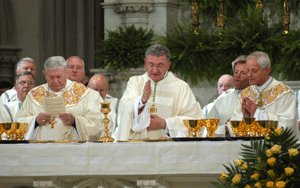They gathered quietly for the "Service of Apology." The roughly 250 people who came together at St. Paul Cathedral did not share the usual greetings with fellow parishioners that can be seen before Mass on any given Sunday throughout the Diocese of Pittsburgh. Many of these people were strangers to each other, but all were gathered for the service led by Pittsburgh Bishop David A. Zubik April 7. Bishop Zubik had announced in a mid-Lent column in the Pittsburgh Catholic, the diocesan newspaper, that he would conduct the service for those "who have been harmed by the church in any way. There will be nothing expected of you but your presence and your willingness to pray with me." Those who took their seats at the cathedral that evening were a mix of men and women, with the older more evident than the young. "I stand before you tonight as shepherd of the church of Pittsburgh," he said, "and embrace the presence of each of you, women and men, who have come here tonight showing by your presence that somewhere, some time in your life, you have been hurt by someone who was entrusted to represent Jesus Christ and his church, but failed to do so."
Bishop Asks Forgiveness from Those Harmed by Church
Show Comments (
)
Comments are automatically closed two weeks after an article's initial publication. See our comments policy for more.
The latest from america
Perhaps it is the hard-won wisdom that comes with age, but the Catholic rituals and practices I once scorned are the same rituals and practices that now usher me into God's presence, time and time again.
"Only through patient and inclusive dialogue" can "a just and lasting conflict resolution can be achieved" in the long-running conflict between Israelis and Palestinians, said the Holy See's permanent observer to the United Nations.
The ”Bad Guys” films ask, how do we determine who the “bad guys” are? And if you’re marked as “bad” from the start, can you ever make good?
In these dark times, surrounded by death and destruction in Gaza, we hear the command in the first reading, “Choose life.” What are the ways we can do this in a world that seems to have gone mad?








